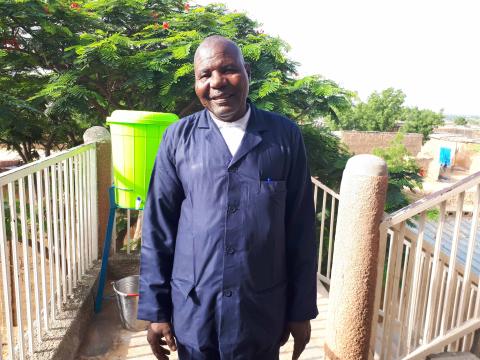Equipping faith leaders to work in fragile contexts - Rev. Kannay's story

Located in the southern part of Niger and covering part of the central region, Maradi is characterised by high displacement figures; pointing to a high level of urgency for the thousands of families in need of assistance. This situation has put humanitarian actors under the spotlight in the region, where the security situation is unstable in the southern part.
Providing support to vulnerable populations in fragile contexts often exposes responding staff criminal attacks. World Vision has developed the 'Do No Harm' approach allowing humanitarian workers to work in conflict situations and to support local capacities for peace.
Religious leaders play an important role in the prevention and management of conflicts because they have a direct link with believers. Only they have the legitimacy to express a religious dialogue to increase tolerance in the aim of building peace instead of violence. Thus, religious leaders such as Reverend Kannay have been trained on this approach.
He narrates his experience with the approach:
‘’My name is Kannay Garba, I am the regional president of the Niger Republic Evangelical Church in Maradi, 57 years old and a father of five children. For a long time I have seen different project staff working in surrounding villages. They seem to solve problems immediately within the community. I was often struck by the number of people who gathered to attend to their activities. I honestly thought that it was because of the donations that people mobilised to listen to them. I had no idea that they had a great training weapon which they apply for the success of their projects.
But one day I was selected too to participate in a training called 'DO NO HARM'. Through this training I learned that one of my most important roles as a religious leader is to strengthen social cohesion and peace. I learned, with supporting examples, the different techniques on conflict resolution which include avoiding placing blame on one party or the other, pushing for a win-win outcome.
I remember as if it was yesterday, a conflict that I tried to resolve which turned sour. It was a situation between a member of my church and his family who refused to give him a share of his inheritance. When the young man came to me he explained that they wanted to deprive him of his rights because of his faith. I immediately judged and concluded that his family was not right. I vouched for this case which was even taken to the legal authorities. After ruling, the court decided that the young man was right and that the land belonged to him. I am sad to say that the ruling became an interfaith conflict in my village. My safety and that of my family had become threatened, I could not even leave my house anymore because the angry villagers wanted to kill me. They tried to stone me or beat me. I suffered greatly because my ministry activities of evangelism came to a halt.
I thank God for the opportunity to be part of those who received this training. If I had received it before, I believe I would have made better judgements and not endured all the pain and rejection from my community. I am now equipped on how to get people’s attention for peace, I can work well in a conflict context without harming anyone. What is interesting about this training is that I can use what I have learned even within my family. Previously, my children did not get along, there was great conflict and accusations between them. Some did not even speak to each other but after this training I decided to gather my family and listen to everyone without judging anyone. After listening to them I understood that the fact that I give my view on a matter without listening to them was frustrating to them, causing some to feel less loved. But by applying what I learned in this training, every child apologised to the other and peace returned in my home.
For me, disseminating this knowledge to others is like planting trees in a desert. Those trees will grow and become a source of blessing. This training is a blessing that God has given to Niger Church. I wholeheartedly thank World Vision, which ensured the implementation of this training. May God bless them."
---
To learn more about World Vision's Do No Harm approach, click here.